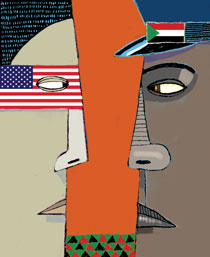American View
Feature
Commentary: On the Banks of Denial

The Sudanese security officer fingered my American passport and asked where my family was from. “America,” I said. He smiled, and then pressed further: “Where was your family from before America?”
The authorities had long claimed that Jewish organizations were behind the fighting in Darfur. In July 2007, the Sudanese defense minister told a Saudi newspaper that Jewish groups were using “all means” to fuel the conflict. By March 2008, the Sudanese government was accusing humanitarian agencies of being part of a larger Zionist conspiracy. All in all, it was not a good time to be an aid worker in Sudan if you were Jewish.
I have spent most of the past four years working for humanitarian organizations in some of the worst places in the world, including Afghanistan and Iraq. Never before had my religion been an issue. Yet during a recent trip to Darfur, watching a Sudanese security officer play with my passport, I had to consider an agonizing question: If asked my religion, would I deny that I was Jewish?
According to Rabbi Aryeh Kaplan in his Handbook of Jewish Thought (Moznaim), if a person’s life is in danger he may violate almost any law to save himself: “You shall keep My laws and rules, by the pursuit of which man shall live” (Leviticus 18:5). Three sins are exceptions to that rule, even at the cost of one’s life: those associated with idolatry, murder and sexual crimes. For a Jew to deny his religion is akin to idolatry.
That said, there is still some room to maneuver. Kaplan writes that “It is permitted to make an ambiguous statement, to act like a non-Jew, or to disguise oneself as such.”
Without realizing it, I had been walking this very line for years. I let my Afghan and Iraqi colleagues simply assume I was Christian. I smiled when someone wished me Merry Christmas and accepted the occasional Christmas present with as much tact as I could muster. Whenever someone asked my religious views, I would simply state I believed in one God, which was usually sufficient to satisfy colleagues’ curiosity. If the conversation showed signs of continuing, I would change the subject.
The irony was twofold. As an agnostic, I wasn’t even sure that there was a God in the first place. At the same time, being in outposts where I could not openly practice my Judaism, even if I chose to, made me value it—and think about it—all the more.
All of which went through my mind as I sat in a small, dark office in Darfur, watching the Sudanese security officer play with my passport. I assumed that the questions about my family were a roundabout attempt to determine my religion. I smiled, hoping he wouldn’t notice how scared I was, and told him that my family was originally from Germany.
I waited for the next question, sure he would tire of this charade and simply ask whether I was Jewish. And in that moment, I decided I would lie. I thought about what might happen to me—an unpleasant evening or two or three, and then possibly being deported. I thought about what might happen to my Sudanese colleagues, the danger they would face if it were known that they were working with Jews, especially given the Sudanese government’s conspiracy theories about Darfur.
But the next question never came. The officer nodded to me, made a benign joke and ended the interview.
It was only months later, once I was back in the States, that I read Kaplan’s explanation and realized that denying my religion might have been a cardinal sin. And yet, I am not sure that knowledge would have made my decision any easier. H
Michael Kleinman is now a consultant on humanitarian issues living in Los Angeles.










 Facebook
Facebook Instagram
Instagram Twitter
Twitter
Leave a Reply